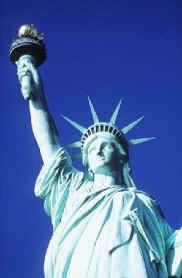
Made in America
The Wonton Food Company, the world’s largest producer of fortune cookies, is based in New York. It makes almost 2.5 million of the crispy cookies each day.

The State of Franklin
Tennessee became the country’s 16th state in 1796. But for many in the former territory’s eastern counties, this was not their first experience with statehood. Those counties had briefly seceded from North Carolina and declared themselves the State of Franklin in 1784, a government which stayed in place for almost four years.

You’ve Been Westinghoused
The creation of the electric chair, financed by Thomas Edison, was originally intended as a marketing ploy. Edison’s company, which sold direct current generators, planned to demonstrate how dangerous alternating current could be by using a Westinghouse generator to power a killing machine. For years after the first successful execution, the general public referred to a death by electric chair as being “Westinghoused.”

First Vending Machine Sold Holy Water
Historians claim that the first vending machine dispensed holy water in Egyptian temples. But the first, coin-operated, vending machine showed up more than 2,000 years later, selling postcards in 19th century England. The United States got its first such contraptions only a few years later in 1888. They sold Tutti-Fruiti Gum.

Folding Paper
A piece of notebook paper must be folded in half, three times, to equal the thickness of a finger nail. Fold it four more times, and the paper will be as thick as a small notebook. Most people can’t fold the paper in half, an eighth time. But if you could continue folding it in half, over and over again, the paper would be as wide as your hand on the 10th fold, as tall as a stool on the 12th fold, and it would reach the sun on the 50th fold.

Efficient Use of Space
A 2-story outhouse might not seem like a very good idea, but several communities boast such structures, including Phelps, N.Y. (pictured), and Silver City, Idaho. (The trick is to offset the two levels.) But Bryant Pond, Maine, puts them all to shame with what may be the nation’s only 3-story outhouse.

Inspiration for the Windshield Wiper
Most motor vehicles can be comfortably driven through rain and sleet, but that wasn’t always the case. When Mary Anderson saw a New York streetcar driver, getting out of his vehicle to clear the windshield, she knew she could make a difference. Anderson opened her sketchbook and worked out a design for the windshield wiper, which she patented in 1905. It became a standard feature on American-made automobiles as early as 1916.

How to Lose Weight
Differences in the rate of the earth’s rotation as well as irregularities of shape may not seem relevant to non-physicists. But the effects are measurable for those who intend to lose weight after the holidays. It turns out that objects weigh almost 1 percent less at the equator than they do at the poles.

Once in a Blue Moon
How long is “once in a blue moon?” It depends. A blue moon is the second full moon in a single month. The last blue moon was July 31, 2004. The next one is scheduled for June 30, 2007. But they’re not always that far apart. In 2018, there will be one blue moon in January and another in March.

Toyota Corolla Wins Popularity Contest
More than 15 million Ford Model T automobiles were built in the 20th century. Volkswagen surpassed that mark with its more than 21.5 million Beetles manufactured. But neither company holds the record. The Toyota Corolla was up to 24,986,607 vehicles and counting in December 2000.
Elmer & Elsie
It has been estimated that more than 47 million children use Elmer’s glue each week that school is in session. Elmer, the bull on the front of each bottle, was created shortly after the 1939 New York World’s Fair. Borden’s spokescow, Elsie, was a big hit at the fair, so the company created her husband to help sell the corporation’s non-food products.

Betty Crocker to the Rescue
When customers flooded the Washburn Crosby Company in 1921 with questions about baking with Gold Medal flour, the corporation created a fictional expert to offer help. The last name “Crocker” came from a retired director, and the first name “Betty” was chosen because it sounded friendly. Female employees submitted handwriting samples for the signature, and the “most distinctive” became the standard, still in use today.

Klingon Bible
Serious Star Trek aficionados have translated portions of the Bible and other literary works into Klingon, which one organization refers to as “the galaxy’s fastest growing language.” But their crowning achievement, once completed, may be their restoration of the complete works of Shakespeare into the “original Klingon.” Well done (majQa’)!

Saving the Statue of Liberty
In August 2001, the National Park Service hired experts to build a precise computer model of the Statue of Liberty, using 100 million data points, so the monument might be repaired or rebuilt if disaster should strike. The Capitol, in Washington, D.C., is also being measured.

The Modern Santa Claus
An early Christian bishop in the Middle East was probably the model for the modern Santa Claus. Nicholas, the orphan of wealthy parents, was known to secretly give away his riches to the poor. Historians say the feast of St. Nicholas, traditionally celebrated on Dec. 6, eventually merged with the Christmas holiday.

Living to Race
When James Cleveland “Jesse” Owens (pictured) came home from the 1936 Olympics with four gold medals, he didn’t receive the endorsement opportunities that usually follow that kind of athletic success, so he made a living for a number of years by running in staged races against dogs and horses.